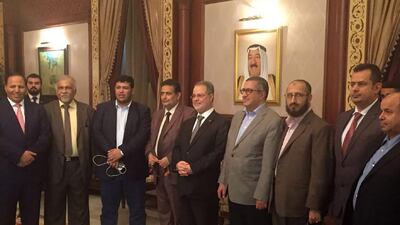Aden // A Yemeni government delegation has returned to Kuwait to attend a final session of UN-mediated talks today before the negotiations are suspended.
The minister for human rights, Ezzadeen Al Asbahi, said the delegation was expecting a new schedule of talks to be announced but had returned mainly “for the sake of thanking the emir of Kuwait, the people and government, and to say farewell to the people who tried to helped Yemen and to the UN special envoy to Yemen Ismail Ould Cheikh Ahmed.”
The halt in peace talks comes as a new UN report accused the Houthi rebels of using civilians as human shields and siphoning funds from the central bank to pay their fighters.
Mr Cheikh Ahmed announced the suspension of talks in an interview on state-run Kuwait TV on Thursday.
“We plan to hold the final session on Saturday,” he said.
“We are working on issuing a communique that will emphasise on the main points we have achieved.”
He said the talks would resume later, without providing a specific date or the location but he added that they could return to Kuwait.
The government had agreed to a proposal by Mr Cheikh Ahmed to save the talks last week after the Houthi rebels unilaterally announced the formation of ruling council together with the party of their ally, former president Ali Abdullah Saleh.
The Iran-backed rebels rejected the plan, which called for them to withdraw from the capital Sanaa and other territory they have seized since September 2014 and hand over heavy weapons stolen from the military. They insist on the formation first of a national unity government and appointment of a new consensus president to oversee the transition.
Yemen’s civil war escalated in March last year after the rebels attempted to overrun more territory including the southern city of Aden where the internationally recognised president Abdrabu Mansur Hadi had set up his government after fleeing Sanaa. A Saudi-led military coalition which includes the UAE has helped government forces wrest back territory but the capital remains in rebel hands and fierce fighting rages for Yemen’s third city, Taez.
Human rights minister Al Asbahi confirmed the UN report presented to the Security Council this week that accused the Houthis of using civilians as human shields in Taez
"The Houthis rebels store their weapons in residential areas, and they enter residential areas launch battles to avoid coalition air strikes and prevent the pro-government forces from targeting them," Mr Al Asbahi told The National.
The UN report carried a photograph of a tank parked at Taez University and said it was investigating several reports of civilian sites used as shields.
Mr Al Absahi said the Houthis last year held two journalists captive inside a weapons depot in Thamar province, and both of them were killed when coalition air strikes destroyed the depot.
The UN report also accused the Houthis of siphoning funds from Yemen’s central bank to pay their fighters. It said they had diverted about $100 million a month from the bank, with foreign reserves dropping to $1.3 billion in June 2016 from $4.6bn in November 2014.
Mr Al Asbahi said the rebels were also receiving financial support from Iran, “but the Houthis will continue to consume the reserves of the central bank until they finish the funds there”.
“The rebels consume the reserves of the central bank and employ the income of the country to pay fighters to kill Yemenis,” he said.
The UN report, which covers the past six months, was compiled by a panel experts who said they gathered information remotely because they were unable to travel to Yemen.
The report said Al Qaeda and ISIL, which have taken advantage of Yemen’s war to increase their presence in the country, were now “undermining one another as they compete for recruits”.
It said that in March and April “ISIL received a significant influx of cash in Yemen, which it is using to attract recruits, finance operations, and purchase equipment”. The report did not specify the source of the money.
foreign.desk@thenational.ae
* With additional reporting from Agence France-Presse

